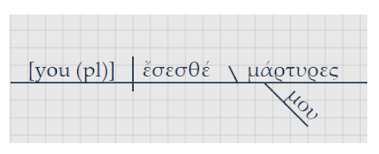28 August 2023
We'll start below with ἔσεσθε, the third verb in Acts 1:8, but first - here's the entire verse again:
ἀλλὰ λήμψεσθε δύναμιν ἐπελθόντος τοῦ ἁγίου πνεύματος ἐφ' ὑμᾶς, καὶ ἔσεσθέ μου μάρτυρες ἔν τε Ἰερουσαλὴμ καὶ ἐν πάσῃ τῇ Ἰουδαίᾳ καὶ Σαμαρείᾳ καὶ ἕως ἐσχάτου τῆς γῆς.
3 ἔσεσθε: 2-P, future indicative, εἰμί
The ‘you’ again refers to the apostles. So the apostles will do two things in this
verse:
- they will receive
power
- and they will be, or
become . . . . what?
Ἔσεσθε is a linking verb, with the predicate μάρτυρες,
‘witnesses’. Diagrammed, the phrase
would look like this:
The
remainder of the verse explains where the apostles will be witnesses (for
Jesus):
ἔν τε Ἰερουσαλὴμ καὶ ἐν πάσῃ τῇ Ἰουδαίᾳ καὶ Σαμαρείᾳ καὶ ἕως ἐσχάτου τῆς γῆς
The small word τε is an enclitic particle, often not translated. It is used here in connecting a series of items with similar function: Jerusalem, all Judea, Samaria, and the ends of the earth are all places where the apostles will be witnesses.
but you will receive power when the Holy Spirit has come upon you, and you will be witnesses for me in Jerusalem and in all Judea and Samaria, and to the end of the earth


No comments:
Post a Comment
Comments